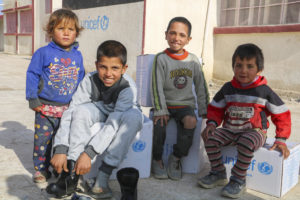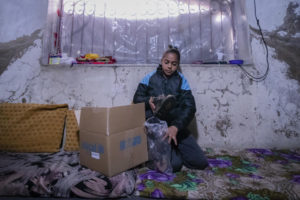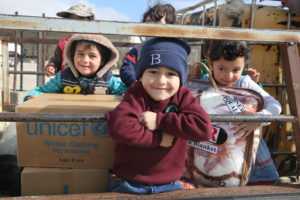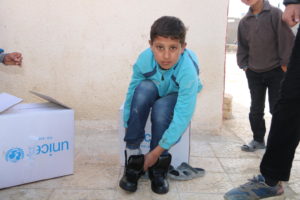This blog post was provided by Kate MacRae and Nadine Metwaly-Duguay from UNICEF Canada.
Conflict has changed every part of Syria over the past nine years, especially winter. Any happy memories of snow filled streets and fields are now gone. Forced to flee their homes and live in camps and shelters offering little protection from the cold, winter is an immense struggle for children in Syria. Freezing temperatures, snow, and heavy rain make life intensely difficult for children who have been forced from their homes and who are already facing the ongoing threat of COVID-19.
“The winter months are even more brutal for children inside Syria,” says Hanaa Singer, UNICEF Syria Representative describing her visit to Aleppo. “I saw children who fled their homes with nothing but the clothes on their back. After the horrors they have lived through, now they have to cope with the piercing cold.”

Aboud, 13, (in grey) and his siblings try on their new winter clothes from the UNICEF-supported winter clothing kit they received in Ma’adan city, Raqqa in the northern region of Syria. “Our income has been very limited since my father passed away, with only my older brother able to work,” explains Abboud who was displaced with his family almost three years ago, as violence escalated near their home in rural Raqqa.

Nahla, 13, opens her winter kit in Hassia, rural Homs, where she and her family sought shelter from the conflict. Every day, Nahla, together with her siblings and other children go on a scavenger hunt around the Hassia industrial zone, looking for garbage and factory waste to be used as fuel; the only means for most families to get some warmth during the harsh winter.
“We sometimes have to go out in the cold multiple times a day to search for junk we can burn for warmth,” explains Nahla.
UNICEF’s winter campaign aims to reach the most vulnerable children aged between three months and 16 years old, who live in camps, settlements and rural areas.
For children who live in areas with shops and facilities, families are provided with cash assistance, to help them purchase winter clothing from local business owners. In rural and lesser developed areas and settlements, UNICEF provides children with winter clothing kits – including a set of warm clothes, gloves, hats, boots, socks, scarves and thermal blankets.

In winter 2019 UNICEF reached over 10,000 children in Syria – as well as many more who have fled to neighboring countries – with winter clothing kits and cash assistance. This year significant needs have persisted across all of UNICEF’s emergency program areas in Syria, which have only been intensified by the continued economic downturn and the COVID-19 pandemic.
COVID-19 has also affected children and teachers after schools in Syria re-opened in September. Despite these challenges, UNICEF has continued to respond to children’s needs across the country, while also scaling up our emergency water, sanitation and health (WASH) and nutrition responses in northeast Syria.
From the beginning of 2020, UNICEF provided 204,096 children with winter clothes, new-born baby kits and blankets, to help protect them against winter storms – especially those children like Nahla who live in makeshift settlements that lack electricity and heating. Our goal is to reach an additional 435,000 children with winter clothing kits by March 2021 but we need the support of Canadians in order to do so.

When you donate to UNICEF Canada, you know that you’re helping to change a child’s life. Your donation will help UNICEF reach more children in Syria with access to education, health care, safe water, food and more. Here are just a few examples of how you can make an impact:
- A gift of $34 can provide one child with winter clothing to stay warm this winter;
- A gift of $50 can provide urgent aid to 112 children in need of immediate life-enhancing nutrition, education and emergency relief;
- A gift of $68 can cover the cost of enrollment and school supplies for a displaced child;
- And a gift of $131 can restock a malnutrition treatment centre with food, therapeutic milk and oral rehydration salts to reach 368 children.
Donate to UNICEF Canadaand support the world’s farthest-reaching humanitarian organization for children. Our work for every child relies entirely on voluntary support, including donations from generous Canadians like you.
Leave a Reply